
Why Entrepreneurs Fail Financially: Mistakes That Kill Growth
Here’s why many entrepreneurs struggle with their finances—and how to avoid the traps that derail success.
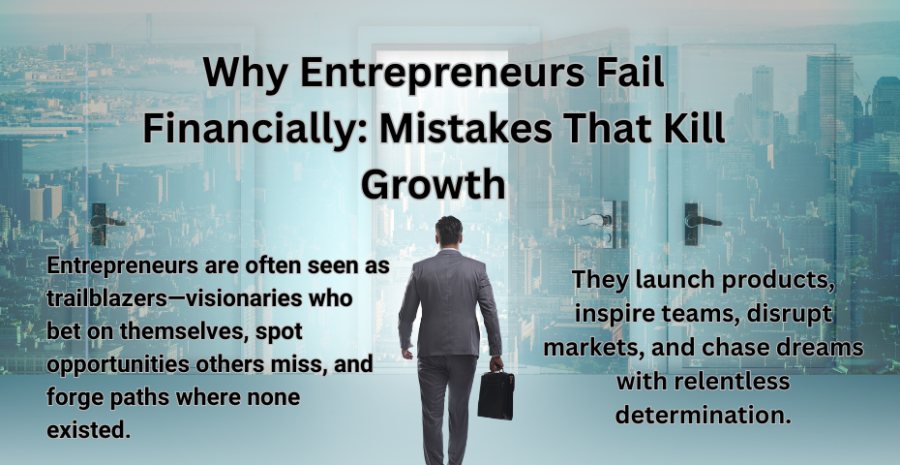
Introduction
Entrepreneurs are often seen as trailblazers—visionaries who bet on themselves, spot opportunities others miss, and forge paths where none existed. They launch products, inspire teams, disrupt markets, and chase dreams with relentless determination.
But behind the scenes of these bold moves and headline-worthy ventures lies a less glamorous and often-overlooked reality: many entrepreneurs are quietly struggling with their finances. It’s not because they aren’t capable or intelligent. On the contrary, many founders are incredibly resourceful. The problem is that the mindset required to succeed in business can be the same mindset that leads to poor financial decision-making.
Traits like risk tolerance, aggressive reinvestment, overconfidence, and a relentless focus on growth can cause even the most successful entrepreneurs to lose sight of basic financial principles. They often believe they can "out-earn" their spending habits or think personal finance can be put on hold until after the next big win.
Unfortunately, the financial wreckage that builds up during the early years of the hustle can sabotage long-term success. Debt piles up, taxes get overlooked, emergency funds are neglected, and poor financial structure becomes a ticking time bomb.
The irony is stark: entrepreneurs can create multi-million-dollar enterprises but still fail to build personal wealth or protect their financial futures. Many feel shame or confusion when they realize their business success doesn’t equal financial freedom.
But this gap is not a failure of ambition—it's a failure of education and planning. To grow, scale, and eventually exit with security, entrepreneurs must master not just marketing, product development, or leadership—but money management as well.
In this blog, we’ll explore the most common financial mistakes entrepreneurs make and how to fix them before they snowball into disaster.
From not paying yourself to neglecting tax strategy to over-leveraging for growth, we’ll dive into eight dangerous pitfalls and show you how to build a solid, sustainable foundation that supports your business—and your life.
1. Not Paying Yourself a Salary
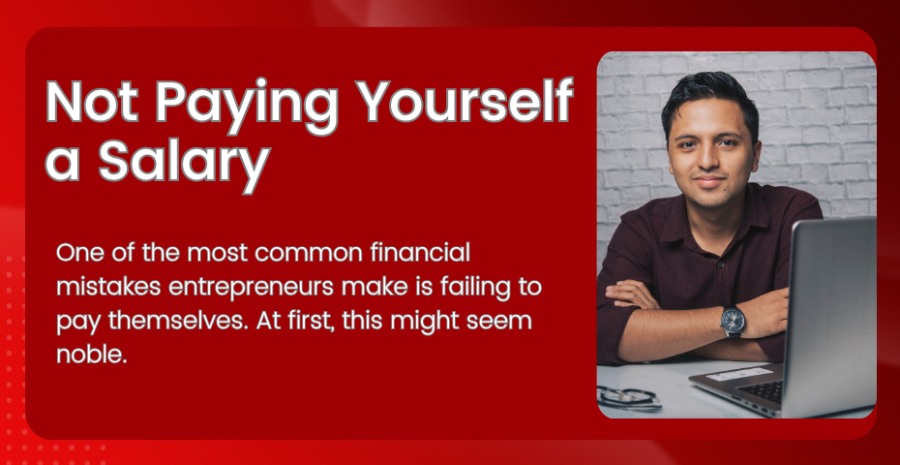
One of the most common financial mistakes entrepreneurs make is failing to pay themselves. At first, this might seem noble.
You’re pouring every dollar back into your business, showing commitment, and betting on future success. But if you continually operate without paying yourself, you're not running a sustainable venture—you’re building a high-risk job.
This approach blurs the line between business and personal finance and makes it impossible to measure whether your business can truly support your life. You end up relying on credit cards, savings, or loans just to live, which creates a dangerous imbalance and long-term stress.
Worse, if your business fails or stalls, you’re left with nothing to show for years of hard work. Paying yourself doesn’t mean draining the business—it means treating yourself like a necessary expense, the same as rent or software.
It also gives you the clarity to make better decisions about the viability of your model. A salary, even if modest, creates structure, discipline, and a clear signal that your business is growing sustainably.
Entrepreneurs must remember: you are your business's most important asset.
If you don’t invest in your own financial well-being, no one else will.
2. Mixing Personal and Business Finances

When you're just starting out, it’s easy to use the same credit card for both groceries and website hosting. But as your business grows, this lack of separation becomes a ticking financial and legal time bomb.
Blending personal and business accounts creates confusion, undermines your ability to track profitability, and makes tax season a nightmare. It can also expose you to legal liabilities, especially if your company is an LLC or corporation.
Courts may “pierce the corporate veil” if they see no real separation between you and your business, leaving your personal assets at risk. On the financial side, mixed accounts make it impossible to understand how your business is truly performing.
You can’t optimize cash flow, plan budgets, or apply for funding without clear records. The fix? Open separate bank accounts, business credit cards, and use accounting software that tracks every dollar. Treat your business like a separate entity—even if you're the only employee.
This not only protects you legally but also gives you the financial clarity you need to make informed decisions, manage growth, and reduce stress.
3. Underestimating Taxes and Not Planning Ahead

Many entrepreneurs make the mistake of thinking taxes are something to worry about “later.” The problem is that “later” comes fast—and with penalties.
Unlike employees, entrepreneurs don’t have taxes automatically withheld from paychecks. If you’re earning income, even sporadically, you’re responsible for estimating taxes and making quarterly payments. Failing to do this can lead to massive tax bills that arrive unexpectedly and drain your cash reserves.
Even worse, interest and penalties can quickly snowball. Many founders also miss out on tax deductions or credits simply because they didn’t keep organized records or consult a tax professional. It’s essential to build a tax strategy into your business operations early on.
This includes tracking all expenses, understanding how your entity is taxed, setting aside 25-30% of your income for tax obligations, and working with an accountant who understands entrepreneurs. Taxes are not a punishment—they’re a reality of running a profitable business.
With smart planning, you can minimize what you owe, avoid panic, and keep more of what you earn.
4. Relying Too Heavily on Debt or Investor Capital
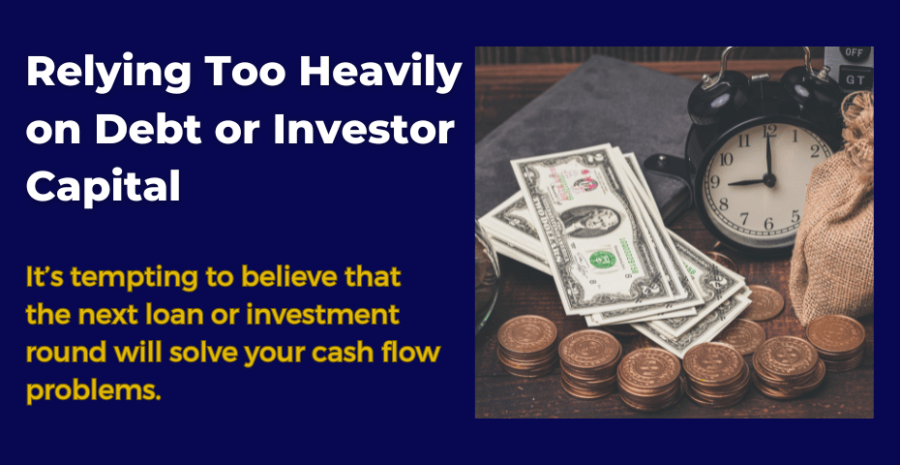
It’s tempting to believe that the next loan or investment round will solve your cash flow problems.
Many entrepreneurs fall into the trap of over-leveraging their businesses, taking on too much debt, or raising funds too early without a clear plan.
While capital can accelerate growth, it also introduces pressure, dilution, and risk. Debt must be repaid—regardless of whether the business succeeds.
Investors expect returns and may influence your decisions in ways that don’t align with your vision.
Over-reliance on external funding often masks deeper problems like unprofitable business models or poor money management.
The key is to build lean and prove your concept before scaling. Focus on generating organic revenue and improving margins.
Use credit and capital strategically, not as a crutch. Sustainable businesses are built on solid financial foundations, not constant fundraising cycles.
Before you borrow or pitch, ensure your business can stand on its own legs. Growth should be a result of strength—not desperation.
5. Ignoring Emergency Funds and Risk Management

Many entrepreneurs live on the edge financially. While this may seem like a badge of honor, it’s actually a recipe for disaster. Businesses, like life, are unpredictable—clients cancel contracts, pandemics happen, markets shift.
If you don't have an emergency fund or backup plan, a small disruption can wipe out years of progress. Risk management isn’t just for corporations—it’s for every founder who wants to stay in the game long term.
An emergency fund, both personal and business, can help you survive slow months, pay team members during down cycles, or pivot when needed. It also gives you peace of mind and decision-making power that panic-driven entrepreneurs lack.
Risk management includes having proper insurance, contracts in place, and contingency plans for operational hiccups. It’s not about being pessimistic—it’s about being prepared.
The best entrepreneurs plan for the worst while building for the best.
That balance is what keeps you stable when chaos hits.
6. Reinventing the Wheel Instead of Using Financial Systems
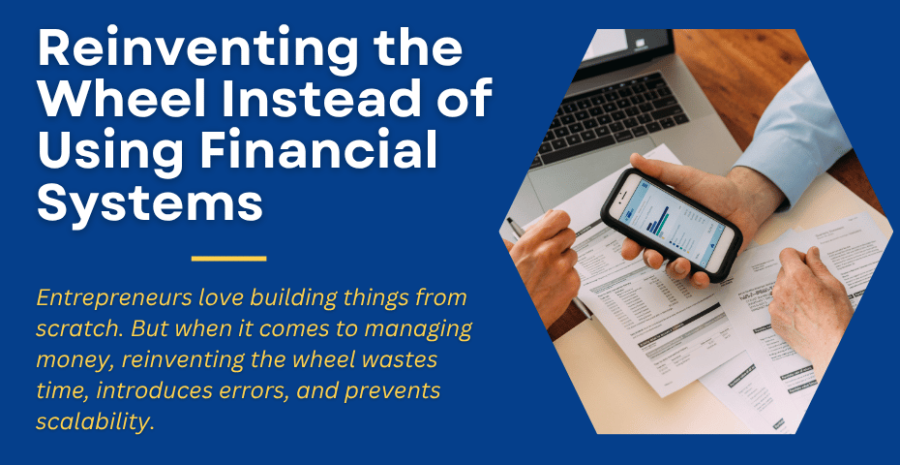
Entrepreneurs love building things from scratch. But when it comes to managing money, reinventing the wheel wastes time, introduces errors, and prevents scalability.
Many founders operate without budgets, track expenses manually (if at all), and delay setting up accounting systems until it's too late. They treat finances reactively rather than proactively.
This approach may work in the hustle phase, but it eventually leads to burnout and inefficiencies. The truth is that financial systems already exist—and they work.
Bookkeeping software like QuickBooks or Xero, budgeting templates, automated invoicing tools, and standard financial statements can save you hours each week.
More importantly, they give you real-time visibility into your business’s health. Systems make scaling possible. They also make it easier to raise money, pay taxes, and avoid fraud.
You don’t have to be a numbers person—you just need the right tools and routines.
Automate what you can, delegate when needed, and always know your numbers.
7. Believing Profit Will “Just Happen Later”
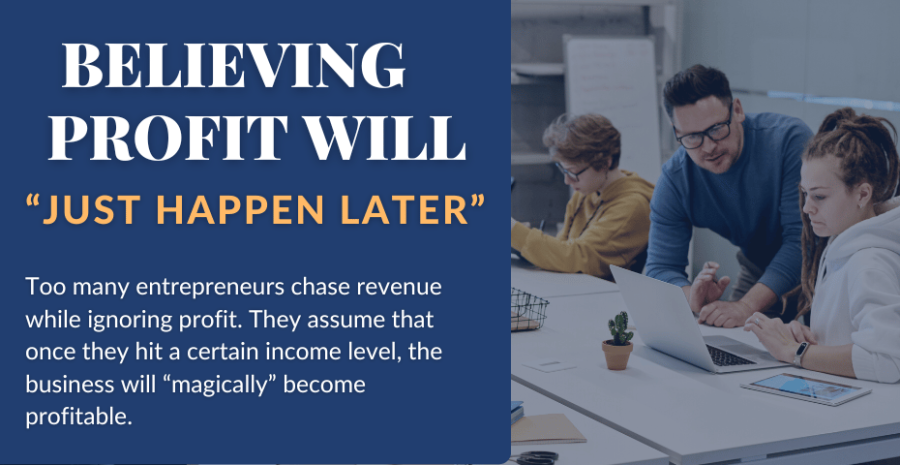
Too many entrepreneurs chase revenue while ignoring profit. They assume that once they hit a certain income level, the business will “magically” become profitable.
But without clear pricing, cost control, and financial discipline, higher revenue often leads to higher expenses—not more profit. This mindset creates a dangerous treadmill effect: you work harder, sell more, but never feel secure.
Profit must be intentional. It starts with knowing your margins, understanding the true cost of customer acquisition, and setting financial goals that go beyond vanity metrics.
Tools like the Profit First method advocate paying profit first—allocating it before reinvesting. This flips the script and ensures that growth doesn’t come at the expense of financial health.
Don’t wait for profit to show up someday—build it into your model today.
You’ll sleep better, reinvest smarter, and actually enjoy the rewards of your hard work.
8. Avoiding Financial Education and Advice

Many entrepreneurs pride themselves on being self-made. While independence is admirable, ignoring expert financial advice can be costly.
Money is a skill, just like marketing or coding. It requires education, experience, and sometimes outside help. Yet, many founders avoid working with accountants, financial planners, or CFOs, thinking it's too expensive or unnecessary.
The irony is that quality financial guidance usually pays for itself many times over. Whether it’s optimizing taxes, planning for retirement, or making better investment decisions, a good advisor helps you grow faster and safer.
Even reading a few books or taking a course in financial literacy can dramatically change how you manage money.
You don’t have to become a finance expert—you just have to care enough to learn. The more you understand your numbers, the more control you have over your destiny.
Entrepreneurship is a long game, and financial wisdom is your greatest long-term advantage.
Conclusion
The journey of entrepreneurship is exhilarating, unpredictable, and deeply personal. But no matter how innovative your idea or passionate your pursuit, poor financial management can sabotage everything you've built. It’s not enough to hustle, sell, and scale—you must also protect, plan, and prosper.
As we’ve seen, the biggest money mistakes entrepreneurs make are often rooted in mindset: the belief that financial planning can wait, that revenue equals profit, or that risk is always worth the reward. These assumptions can lead to burnout, debt, legal trouble, or lost opportunities.
Yet the fix is within reach. Paying yourself a fair salary, separating finances, planning for taxes, building emergency funds, using proper systems, and seeking guidance are not complicated actions—they’re just often overlooked.
The sooner you adopt smart financial habits, the more freedom, stability, and power you create in both your business and personal life. You’ll make decisions from a place of confidence rather than desperation. You’ll invest wisely, scale sustainably, and sleep soundly knowing that your financial house is in order.
Entrepreneurship is not just about making money—it’s about keeping it, growing it, and using it to build the life you envision. If you can master your finances, you can master your future.
Let this be your wake-up call—not just to build a business, but to build lasting wealth.
The choice is yours—make it count.
....................................................................................................................................................................................................
About: Andries vanTonder
Over 46 years selfemployed
He is a Serial Entrepreneur, an Enthusiastic supporter of Blockchain Technology and a Cryptocurrency Investor
Find me: Markethive Profile Page | My Twitter Account | My Instagram Acount | and my Facebook Profile.
